

Massachusetts finalizes rule requiring physicians to demonstrate EHR proficiency. A new Massachusetts state law requires physicians to demonstrate proficiency in using EHRs as well as the skills to attest to meaningful use, according to a Health Data Management report.
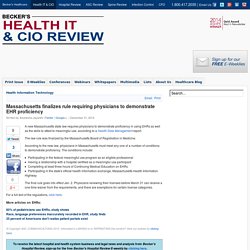
The law rule was finalized by the Massachusetts Board of Registration in Medicine. According to the new law, physicians in Massachusetts must meet any one of a number of conditions to demonstrate proficiency. The conditions include: Participating in the federal meaningful use program as an eligible professionalHaving a relationship with a hospital certified as a meaningful use participantCompleting at least three hours of Continuing Medical Education on EHRsParticipating in the state's official health information exchange, Massachusetts Health Information Highway The final rule goes into effect Jan. 2. For a full text of the regulations, click here. More articles on EHRs: © Copyright ASC COMMUNICATIONS 2015. ICD-10 'war' continues. In some quarters, vigorous opposition to ICD-10 implementation is turning into guerrilla warfare.

The Texas Medical Association is encouraging physicians to lobby Congress for a two-year ICD-10 delay. They even provide the text that physicians should cut and paste onto their personal stationery. The TMA letter cites the number of ICD-10 codes, costs, reimbursement delays and competing federal mandates. Nothing new here. AMA: Freeze ICD-10 in carbonite! It's no secret.

More scrutiny coming for Medicare Advantage, Obamacare. The abuses suspected in Medicare Advantage are more subtle and complex.

Unlike standard Medicare, in which doctors and hospitals bill for each service they provide, private Medicare Advantage plans and other managed care organizations are often paid a flat monthly rate for each patient using a formula called a “risk score” that estimates the health challenges facing individual patients. Basically, Medicare pays higher rates for sicker patients and less for people in good health. But federal officials concede that billions of tax dollars are misspent every year because some Medicare health plans exaggerate how sick their patients are, a practice known as “upcoding.” At least six whistleblower lawsuits alleging that Medicare health plans inflated risk scores to overbill the government are pending in federal courts. Eric Topol unplugged at AHIMA. ICD-10 delay has hurt readiness.
The Workgroup for Electronic Data Interchange this week shared the results of its latest ICD-10 survey with HHS Secretary Sylvia Mathews Burwell.

It suggests that some momentum was lost as payers, vendors and providers eased up on the gas pedal. [See also: ICD-10 'storm' posing dilemmas for health information management strategies] In a Sept. 24 letter to Burwell, WEDI offered its analysis of the August 2014 survey, which aims to offer a progress report of industry readiness with the Oct. 1, 2015 switchover date just a year away. Of the 324 providers,103 payers and 87 vendors polled, the numbers suggest the latter two groups "continue to make progress," WEDI Chair Jim Daley writes, "but some tasks are slipping into 2015, particularly those related to testing. " [See also: ICD-10 cost a 'crushing burden' for docs] True, the deadline change has made for an extra year to get technology and processes in order.
4 signs the ACA is working. The Affordable Care Act: Should it stay or should it go?
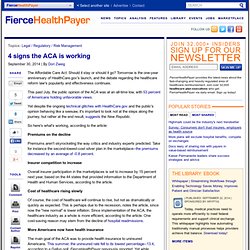
Tomorrow is the one-year anniversary of HealthCare.gov's launch, and the debate regarding the healthcare reform law's popularity and effectiveness continues. This past July, the public opinion of the ACA was at an all-time low, with 53 percent of Americans holding unfavorable views. DeSalvo strikes interoperability chord. ONC chief Karen DeSalvo, MD, promised an audience of AHIMA members that the government would act "fast into interoperability.

" She drew applause when she added, "We cannot wait for 10 years to get this done. " DeSalvo emphasized that every other industry has already achieved interoperability. The message resonated with the 2013 AHIMA conference audience whose work is dedicated to making sure healthcare data is accurate and secure. In their work, they have seen up close the difference accurate, accessible data makes to patient care. AHIMA's Bowman to docs: Don't fear ICD-10. Despite all the grumbling about the switch to ICD-10, physicians find it more natural to the way they practice, Sue Bowman, senior director of coding policy and compliance at the American Health Information Management Association, said in an interview at Healthcare Informatics.
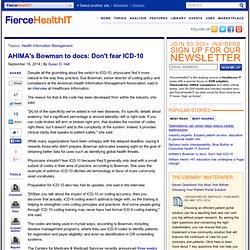
The reason for that is the code has been developed from within the industry, she said. "[A] lot of the specificity we've added is not new diseases; it's specific details about anatomy; but a significant percentage is around laterality--left or right side. If you can code broken left arm or broken right arm, that doubles the number of codes right there; but it doesn't add to the complexity of the system.
Indeed, it provides clinical clarity that speaks to patient safety," she said. HIPAA Risk Assessment Infographic. ICD-10 readiness not there in SearchHealthIT and CHIME survey. Healthcare information and technology specialists who looked at a survey on the impact of the ICD-10 delay found it interesting how many healthcare organizations still aren't ready for the new coding system six months after Congress postponed its introduction until late 2015.
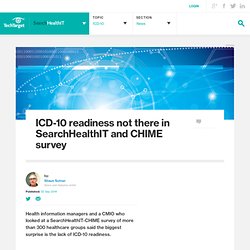
A key finding of the summer 2014 SearchHealthIT survey of more than 300 healthcare organizations -- conducted with the College of Healthcare Management Executives (CHIME) -- was that only 10.7% of the respondents said they were fully ready for ICD-10, though a total of 71.8% reported they were in various states of ICD-10 readiness. Surprise that some not ready for ICD-10 Now with the Oct. 1 rollout date set by the Centers for Medicaid and Medicare (CMS) approaching in a little more than a year, providers should be prepared by now because of all the extra time, said Dan Martich, M.D., chief medical information officer at the University of Pittsburgh Medical Center (UPMC). "Ten percent?
Give me a break," Martich said. HHS signs off on new ICD-10 deadline. The revised compliance date for providers, payers and clearinghouses to transition to ICD-10 has been finalized by the Department of Health and Human Services.
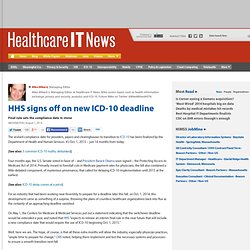
It's Oct. 1, 2015 – just 14 months from today. [See also: 3 common ICD-10 myths, debunked] Four months ago, the U.S. Senate voted in favor of – and President Barack Obama soon signed – the Protecting Access to Medicare Act of 2014. Senate OKs SGR patch, delays ICD-10. Despite physician opposition, the Senate on Monday approved a temporary patch to the sustainable growth rate (SGR) payment formula that will prevent deep Medicare payment cuts for another year and also delays the implementation of ICD-10 to October 2015 at the earliest.
The Senate voted, 64-35, to pass the bill just hours before the 24 percent cut in Medicare payments to doctors was set to take effect. The bill now requires President Barack Obama's signature. UPDATE: Doc SGR fix signed into law. AHIMA urges action on cut-and-paste. The American Health Information Management Association, the organization made up of professionals who manage healthcare information, is urging controls on the copy-and-paste functionality in electronic health record systems. The use of copy-and-paste should be permitted only when such "strong technology and administrative controls," are in place, the organization wrote in a position statement. "Users of copy and paste – reproducing text or other data from one source to another destination – should weigh the efficiency against the potential risk for creating inaccurate, fraudulent or unwieldy documentation," wrote AHIMA, which represents more than 72,000 health information management and health informatics professionals.
[See also: EHR copy and paste? Better think twice.] In its statement, AHIMA called on government and private organizations to work together in implementing its recommendations to address recent concern about the potential for fraud and inaccuracy in EHRs. Health IT Maven Looks Beyond EHRs. ORLANDO -- Robert Wah, MD, is like the Thomas Jefferson of health information technology for physicians. He served as the first deputy national coordinator for health IT when the office was founded within the Department of Health and Human Services in 2004.
Before that, Wah worked as associate chief information officer for military health, which made him the lead physician for health IT for the military. Today, the McLean, Va., resident works as the chief medical officer for CSC, a health IT company in Falls Church, Va. CMS Says Absolutely No Delay for ICD-10 October 1 Compliance Date - HITECH Answers : HITECH Answers. Outlook grim for docs' ICD-10 readiness. By the way things look now, the healthcare industry is not on track to meet the ICD-10 compliance deadline of October 2014. In fact, providers have fallen even further behind with timeline milestones than they did back in February, according to new report findings. But it's not just providers. Vendors also have a long way to go. The Workgroup for Electronic Data Interchange survey concludes that a whopping 80 percent of healthcare providers will fail to complete their business changes and begin testing before 2014.
Moreover, 20 percent of vendors said they were halfway there or less with developing products in support of ICD-10, and 40 percent indicated they wouldn't even have a finished product available until sometime next year. AHIMA 2013 About Much More Than ICD-10. By Ken Congdon, editor-in-chief, Health IT OutcomesFollow Me On Twitter @KenOnHIT Follow Me On Twitter @KenOnHIT In a blog post last week, John Lynn, founder of HealthcareScene.com, said “#AHIMACon13 should be called ICD-10 Con.”
I can see why John felt this way. Darwinian Health IT: Only Well-Designed EHRs Will Survive. By Edmund Billings, MD. Algorithms and Clues. Our MU Stage 2 strategy. Two weeks ago, ONC created a very helpful Certification Guide for EHR technology developers. Many people in the industry have told me that the most challenging scripts are the demonstration of CCDA generation/display/Direct transmission (45 CFR §170.314(b)(1) and 45 CFR §170.314(b)(2)), the Clinical Quality Measures (45 CFR §170.314©(1)-(3)), and Patient View/Download/Transmit (45 CFR §170.314(e)(1)).
Although some stakeholders have suggested that these criteria are too aspirational, using standards that are still maturing, I think it is unlikely that rule making will alter their intent. AHIMA, CHIME Announce Partnership on ADVANCE for Health Information Professionals. As part of a partnership to advance health information management (HIM) and health information technology (HIT), the American Health Information Management Association (AHIMA) and the College of Healthcare Information Management Executives (CHIME) will work together on two timely and critically important issues - information governance and standards. The Urgent Need to Improve Clinical Documentation: Part One on ADVANCE for Health Information Professionals. What did HIMSS13 reveal about the future of health IT? The annual event held by the Healthcare Information Management Systems Society (HIMSS) came to a close on March 7 in New Orleans but has many healthcare and health IT professionals still pondering what they learned and saw at HIMSS13 as well as what steps they will take to take advantage of what was on offer at the show.
After walking the exhibition floors, attending educational sessions, and talking with industry and subject-matter experts, most of this year’s focus was directed in three areas: the difference between interoperability and health information exchange (HIE); the collaborations and alliances formed around EHR adoption; and the effect big data and healthcare analytics on care and cost management. Interoperability and HIE share many similarities, but they are clearly not the same, as the Office of the National Coordinator for Health Information Technology (ONC) has made efforts to publicize in the weeks leading up to HIMSS13.
Epic Officials Question New Electronic Health Record Vendor Alliance. Officials from Epic Systems -- the largest electronic health record provider in the nation -- have said that the recently announced CommonWell Health Alliance could be an attempt by other EHR vendors to take aim at Epic's business, Bloomberg reports (Nussbaum, Bloomberg, 3/5). Radiology, News, Education, Service. No matter how well-designed, easy-to-use, and information-filled a patient portal might be, if the portal's sponsor doesn't make it part of a physician practice or a hospital's operations, it won't be used. Get Primed for HIMSS13: Orientations Available On Demand - General Information - HIMSS13.
Highlights of HIMSS13: ICD-10 takes the spotlight. ICD-10 is on everyone’s mind this year as healthcare organizations prep for the big changeover on October 1, 2014, and it’s sure to be a hot topic of conversation at HIMSS13. Organizers have put a special focus on the new and complex code set during these five days in New Orleans, and attendees have a chance to take advantage of the wealth of collected knowledge from educators and HIM professionals. Here are a few of the ICD-10 sessions on offer during the show, including a day-long symposium to focus on the pressing concerns involved with revolutionizing documentation and medical coding. ICD-10 Knowledge Center: Booth 4581. Exhibitors will display products and services that provide end-users, other vendors and payers with the ability to prepare for, and successfully navigate, the transition from ICD-9 to ICD-10.
Education sessions focus on tutorials around timeline, process, roles and responsibilities, avoiding pitfalls, assessments and training. Sunday, March 3 Monday, March 4. Why CAC can't solve all your ICD-10 problems. Americans like to cure things. The Nitro Primary Care Chronicle. Social Media and the Great ICD-10 Discussion. Countdown to ICD-10: End-to-End Testing Ensures System Readiness « Healthcare Exchange. EHRs and Transcription: Can both live in harmony? HIT Policy Committee to Focus on Clinical Documentation Issues. Mostashari: Paper records are great ... if you're Harry Potter. The Keith W. Boone Daily. In the wake of Hurricane Sandy: Health IT 1, Paper Records 0.
AHIMA releases core clinical documentation guidelines for coding. ICD-10 Debunked & Confirmed: Learning about ICD-10 from the Past, and the North. Benefits of Electronic Health Records Are Seen In the Wake of Hurricane Sandy. AMA continues protest against ICD-10 implementation. Electronic Documentation Templates Support ICD-10-CM/PCS Implementation.